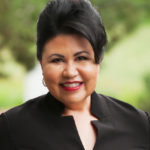Everyone’s confidence falters sooner or later. That’s what I learned shortly after I began to coach C-level executives and emerging leaders over fifteen years ago. It was a refreshing discovery, given the fact that I was fresh out of graduate school, entering the world of consulting thanks to a mentor who happened to believe that I was talented enough for the job.
Little did he know, I’d wake up drenched in sweat before each job. I had a recurring dream, reliving the scene of my first high school presentation: teacher and students staring, half-annoyed that they couldn’t understand my hundred-mile-per-second Spanish accent. Half-mortified that I might hyperventilate and faint.
This is what I learned: lack of confidence is NOT a virus that fancy titles or advanced degrees can cure. Confidence is a muscle that develops over time the more we exercise it.
So, remember this: We don’t “fake it till we make it.” We exercise confidence until it grows more and more. Start your confidence exercise regimen with these five strategies.
“Talk to yourself like you would to someone you love,” says Brené Brown, author and researcher on the topics of vulnerability and human connection. Hint: the stories you tell yourself—whether true or not—always win.
Strike a power pose
In her popular Ted Talk, “Your Body Language Could Shape Who You Are,” Amy Cuddy shares her research on body language: striking a “power pose” (think Wonder Woman or Superman) before entering into a high-stakes situation improves confidence and our ability to project confidence. In short, body language affects how others see us and how we see ourselves.
Speak up. Make eye contact. Don’t rush.
In her book, “Presence: Bringing Your Boldest Self to Your Biggest Challenges,” Amy Cuddy also reveals that confident people initiate speech more often, make more eye contact, speak more slowly and take more time without rushing. Hint: They own their time and are not afraid to pause.
Live with integrity with who you are and what you believe
Sage advice from the high-performance coach, Brandon Burchard, teaches that “when you are being fully alive and authentic and true to yourself, you [automatically] feel confident.” Hint: Stop trying to be like everyone else. Be the real you.
“Firm your handshake,” advises Tony Robbins. He teaches that “a good handshake can set the tone for your future interactions with another individual.” Hint: practice and ask for feedback. No one really likes a limp handshake – neither does it make you feel more powerful.
Humble yourself
This one is from yours truly. In fact, my personal research shows that authentic confidence––the confidence you develop after you’ve experienced failure––is grounded in humility. Hint: be open to feedback. Admit that you don’t know what you don’t know. Remember that humility is the new confidence.



